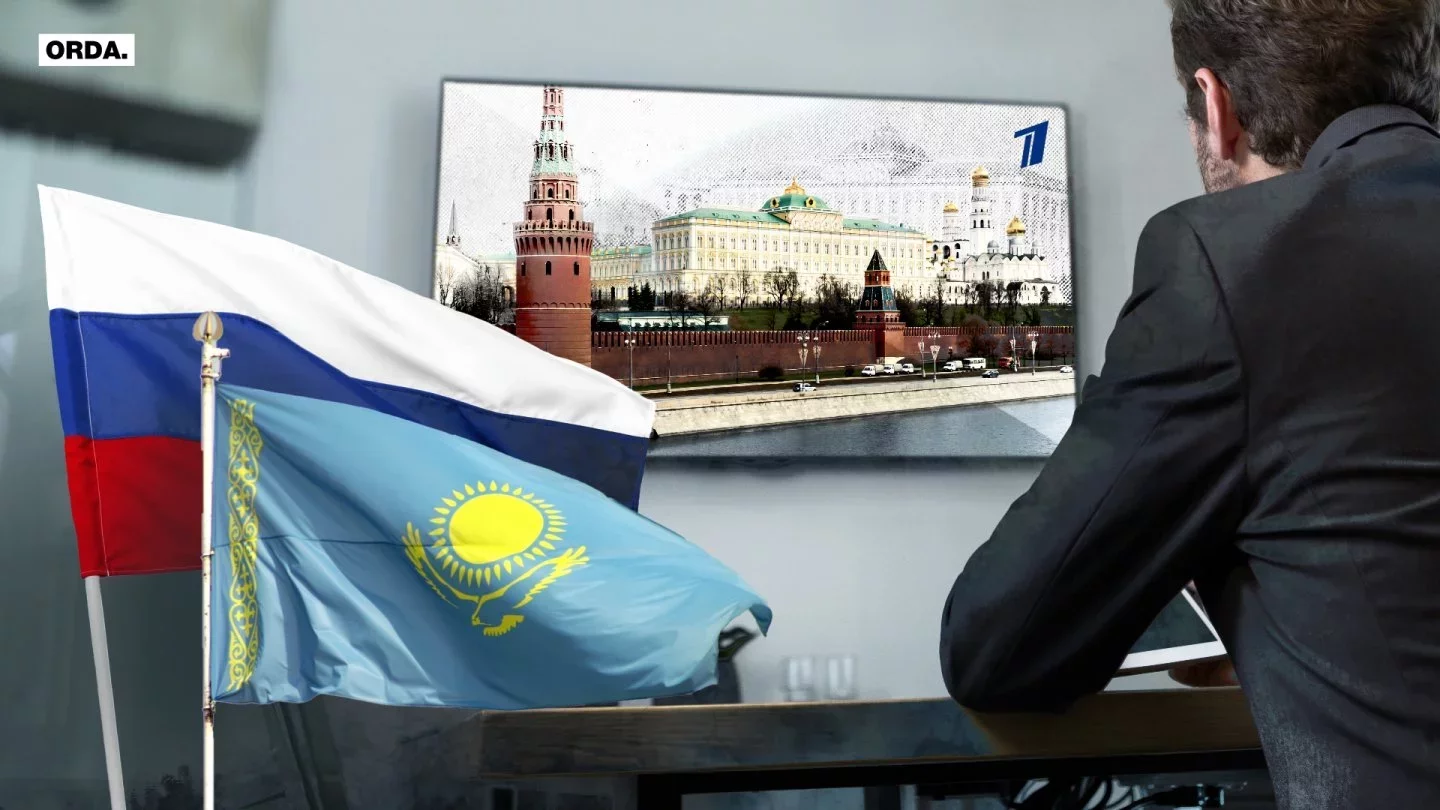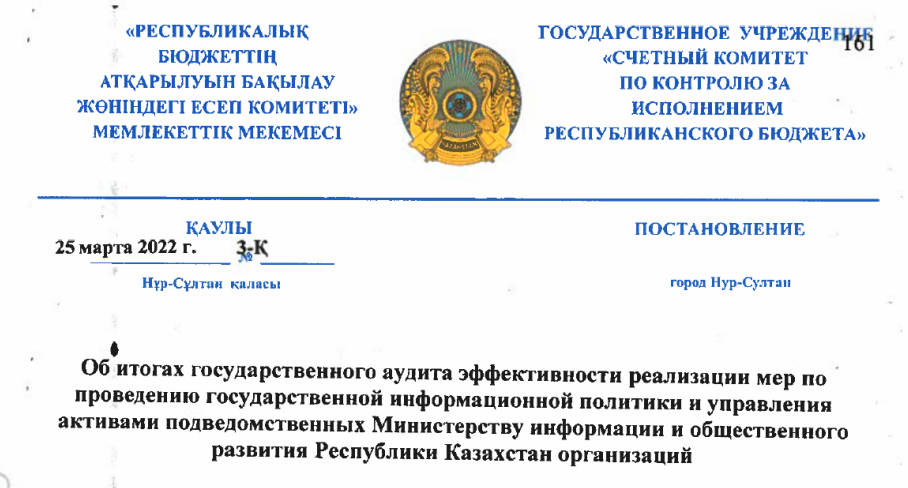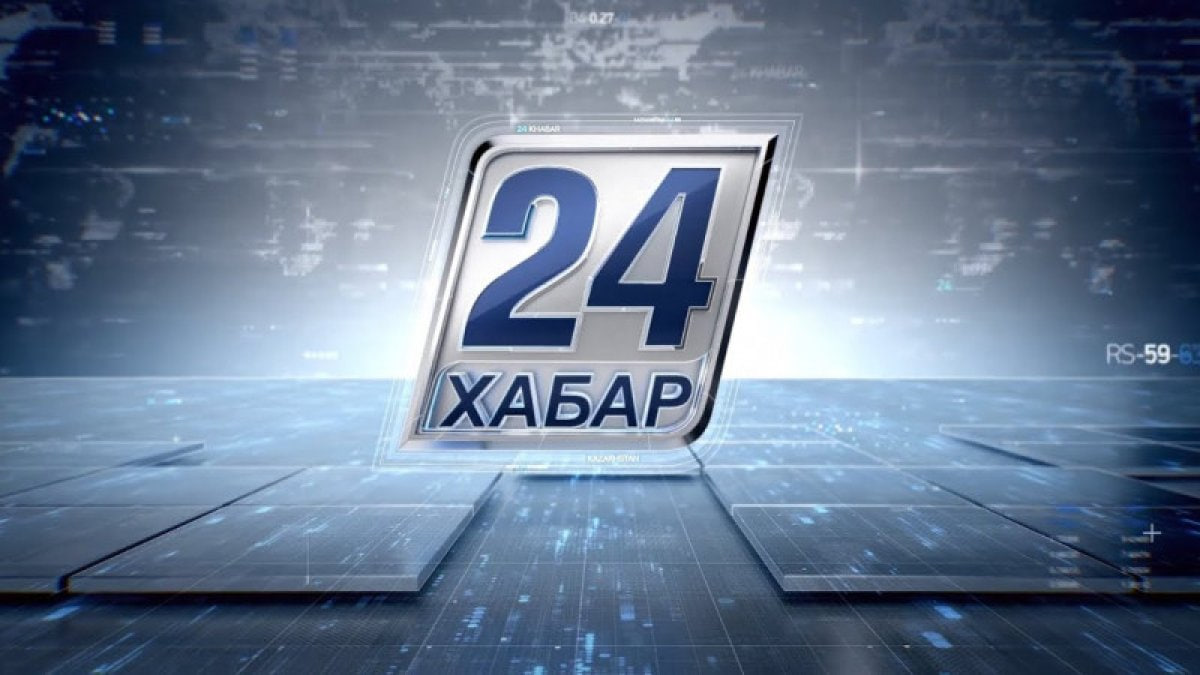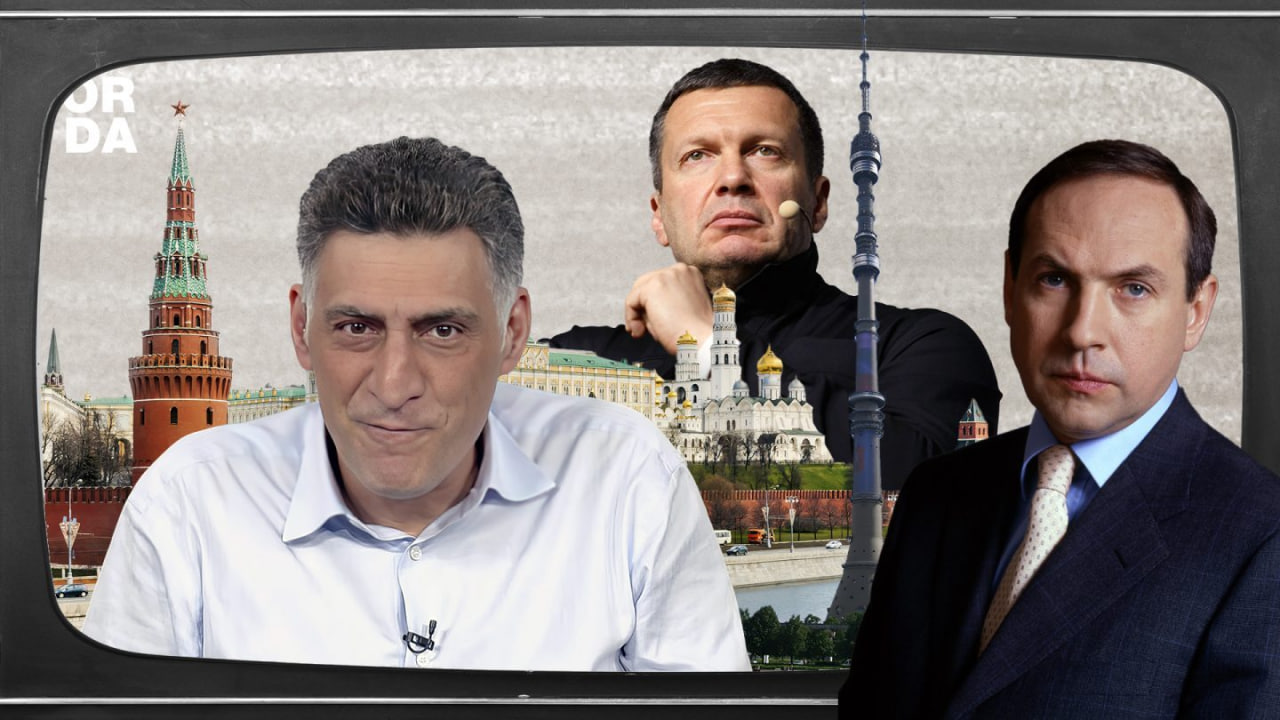Russian Propaganda: How Kazakhstan Spent Billions on Russian Content
 Covercollage Orda.kz
Covercollage Orda.kz
Billions are spent annually on the state information policy. But how effectively they are spent is unknown. Orda.kz has received a Supreme Audit Chamber document. According to it, the QAZAQSTAN TV channel purchased a Russian channel's content for almost four billion tenge. Orda has looked into the matter.
Three Pillars of Kazakhstan's Propaganda
The audit of the Accounts Committee (Supreme Audit Chamber) occurred in 2022. Misappropriation of budget funds was kept under wraps - the document was labeled "for official use."
This is a very convenient lifesaver for officials. They wanted to hide the inefficiency and corruption of the state information order. I believe that the work of the Accounts Committee should be transparent. People should know where their money is going, they should draw conclusions and try to change something, says Diana Okremova, head of the Legal Media Center, who published the report.

In total, from 2019 to 2021, about 153 billion tenge had been allocated for the implementation of the state information policy.
Almost 80% fell into the hands of three organizations subordinate to the Ministry of Information: JSC "Kazakhstan" — 69 billion tenge (42.4%), JSC "Khabar" — 51 billion (31.4%), JSC "Kazteleradio" — 9 billion tenge (5.6%). Yet, more than 3,600 media outlets are registered in the country.
The remaining 20% of the amount was distributed among non-state media. But, according to the auditors, such government orders from the Ministry of Information do not ensure transparency and fair competition.
There are no annual reports on the allocation of budget funds, specific competition criteria have not been defined using phased procedures, there is no clear procedure for making changes to the volume of government orders and a list of thematic areas, the report says.
The auditors also note that, according to the current regulations, a participant, who is not even a media outlet, can end up being the competition's winner.
For example, the 2019 and 2020 state competition winner is indicated in the report. "Black&White Group" LLP won a tender for 16.8 million tenge at the time, but the company was not the owner of the online publication. The commissioned material has therefore not been published on the site.
Four Billion
Other violations appear in the report. But one of the precedents was the budget for a Russian TV channel's content.
It turned out that JSC "Kazakhstan", which receives the most tenders from the Ministry of Information, in 2019-2020 purchased the content of Russia's "Channel One" (Первый Канал -Ed.) for broadcasting on the "First Channel Eurasia" for 3.9 billion tenge. The total amount of screen time was 1,250 hours.
The purchased content of the Channel One TV channel of the Russian Federation is not fully focused on systematic and targeted coverage and clarification of the main priorities of RK state policy and contains news and problems of Russian society. In this regard, there is an inefficient use of budgetary funds for the audited period in the amount of 3,897.3 million tenge. The content broadcast on the TV channel "Channel One Eurasia" takes up only 15% of the airtime, while payment is made in the amount of 90% of the total cost of the license agreement,The auditors noted.

The purchase took place even though the strategic direction of the state information policy was "the development of the domestic information space."

Media expert Diana Okremova believes that such public procurement is inexcusable in a sovereign state.
This is nonsense. The Accounts Committee quite rightly asks the question: why are the problems of Russian society being broadcast and paid for by state funds? I am for any access to information. But I believe that if people choose Russian or other channels, then let them pay the subscription fee for their broadcasting. This should not be a government job. How does paying for a Russian channel improve our sovereignty and information security, which our officials are shouting about from all the stands? This is a relic of the Soviet Union.
Christmas
Any government assignment has a technical specification. The task of tender winners is to match it. But the auditors found that the main thematic areas of state information policy provided for in the agreement were not observed on the "First Eurasia Channel".
It turned out that instead of programs about anniversaries important to the Kazakhstani viewer, such as the 175th anniversary of Abay, the channel showed the program "Orthodox Christians celebrate Christmas."
Instead of the thematic direction - media support for anniversaries, memorable dates, including: the celebration of the 175th anniversary of Abay Kunanbayuly, the 1,150th anniversary of Abu Nasr al-Farabi, the 750th anniversary of the Golden Horde, and the 75th anniversary of the Great Victory, in fact, on 16.01.2020, the program "Main News" hosted the program "Orthodox Christians celebrate Christmas,the auditors wrote.

At the same time, according to research by K Research Central Asia, "The main news on the First Eurasia Channel" is considered the most popular program in Kazakhstan's TV space.
JSC Khabar is also not far behind its colleagues. The management of the second major tender winner of spent 2.4 billion tenge of state funds for the broadcast of the subordinate Kazakh TV channel in Russia.
Thus, Kazakhstan spends funds twice: both for the broadcast of the Russian Federation channel on the territory of the country and for the broadcast of our channel on the territory of the Russian Federation, the auditors wrote.

According to Diana Okremova, this is a global practice when a country broadcasts on the territory of a neighboring state. But does Kazakhstan benefit from this?
This practice exists everywhere. This is done to create the image of the state in another country. But here the issue of efficiency and evaluation is important. I have never seen the ministry report on what Kazakh TV broadcasts in Russia. What kind of "steam" do they have? This should be assessed by attracting investments and tourists to the country.
Russian TV
From the very beginning of the war in Ukraine, there have been calls in Kazakhstan to tune out state-controlled Russian television broadcasting the Kremlin's point of view.
Online petitions were the initial calls for this. They were followed by political figures' appeals. Alikhan Baymenov proposed banning the broadcasting of some Russian TV channels at the national Kurultay last year. After that, people using TV antennas lost access to them, yet viewers with cable or satellite television did not.

But it is noteworthy that in the northern regions that border Russia, Russian TV can be watched without special equipment.
We see the influence of channels where there is continuous Russian propaganda. This can be seen in the older generation, especially those who live in the northern regions of our country. The broadcast contributes to the formation of a biased picture of the agenda, says Okremova
In September of this year, Majilis deputy Maksat Tolykbay even proposed charging Russian TV channels for broadcasting, as "Kazakhstanis are tired of the propaganda of the Russian Federation."
We have a lot of compatriots who broadcast the propaganda. Therefore, interethnic problems periodically arise in some regions. Russian channels are also connected at (my -Ed.) home without my permission, he said.

According to the deputy, the owners of cable networks dish out quite a lot to the Russian side for broadcasting. Meanwhile, Kazakhstani channels are forced to find their way of making it on TV.

Recently, Kazakhstan's authorities blocked the Sputnik24 Internet portal. It provided the ability to watch Russian television, in particular, Russia Today's propaganda TV channels. The official reason for the blocking was "the dissemination of information about conditional access cards to the services of broadcasting operators and equipment that do not have a license in the territory of the Republic of Kazakhstan."
 This is the second Russian service blocked in Kazakhstan. In the summer, the Tsargrad TV channel faced the same fate for promoting extremism. Kaznet users believe that it has repeatedly published anti-Kazakhstani and even anti-Kazakh materials. They ended up in the register of prohibited sites via HTTPS. The channel's management called the blocking a "grand mistake" and an "act of blocking Russian truth."
This is the second Russian service blocked in Kazakhstan. In the summer, the Tsargrad TV channel faced the same fate for promoting extremism. Kaznet users believe that it has repeatedly published anti-Kazakhstani and even anti-Kazakh materials. They ended up in the register of prohibited sites via HTTPS. The channel's management called the blocking a "grand mistake" and an "act of blocking Russian truth."
Two Problems
In addition to wasting budget funds, the auditors noted another problem of Kazakhstani TV — the lack of unique domestic programs.
"The problems are repeated: the abundance of foreign TV series, the lack of unique programs produced in Kazakhstan. According to respondents, Kazakhstan's TV channels follow the path of least resistance, working on a franchise. The broadcasts remain copies, the quality of which is significantly inferior to foreign originals. Rural residents more often indicate that they do not have enough information about the measures taken by state bodies to develop society," the auditors write.

The audit chamber goes on to refer to statistics: the population is dissatisfied with the coverage of state policy in the media for 2017-2019. Although more funds were allocated every year.
The share of those who replied that they were completely satisfied with the coverage of state policy in the media decreased from 23.2% to 10.4%.
According to the results of the audit, inefficient use of budget funds and state assets to the tune of about 12 billion tenge was established in the period from 2018 to 2021.
The Ministry of Information would later announce Kazakhstan's intentions to reduce the purchase of Russian content in favor of domestic content for TV channels in 2024. Responding to Orda's request, the Ministry of Information assured that the broadcast content was not political.
Original Author: Silam Aqbota
DISCLAIMER: This is a translated piece. The text has been modified, the content is the same. Please refer to the original piece in Russian for accuracy. Information in it has been updated as of 15/12/23.
Latest news
- What Has KazMunayGas Been Doing for Past Two Years?
- A Restless Night in Kulsary
- Karakalpak Activists Detained in Kazakhstan Convicted in Absentia at Home
- No Forgiveness: Reactions to Bishimbayev's Sentence.
- Gift for "Old Kazakhstan"? Proposals Made to Decriminalise Certain Crimes
- Head of British Foreign Ministry Visits Astana
- Will Russia Outpace Kazakhstan in Chinese Gas Market?
- "Cases Are Absolutely Absurd" — Human Rights Activists on Cases against Journalists in Kazakhstan
- Orda Interviews Residents of Petropavlovsk's Flooded Suburbs
- Case Involving Journalist Adilbekov: Interior Ministry Commented on Situation
- Is Moscow Extending Reach to Kazakhstan's Oil?
- 500 Tons of Fuel Stolen from National Guard Unit: New Details Emerge
- This Is Foolish and over The Top: Forensic Expert Halimnazarov Comments On Russian Colleagues' Conclusions
- Israeli Ambassador to Kazakhstan Gives Exclusive Interview to Orda.kz, Comments on Recent Attack on His Country.
- Assault, Extortion, Police: Kazakhstani Transgender Sex Workers Reach Out
- Bishimbayev Trial: Baizhanov Could Not Be Intimidated
- "Not a Cousin, but Bishimbayev's Distant Relative": - Bakhytzhan Baizhanov's Lawyer
- Finnish Minister Arrives in Kazakhstan, Sanction Circumventing to Be Discussed
- Deputies Once Again Concerned about LGBT+ Despite Other Problems
- "I Hear The Water": Kostanay Residents in Evacuation Centers Shared Stories about Flood

